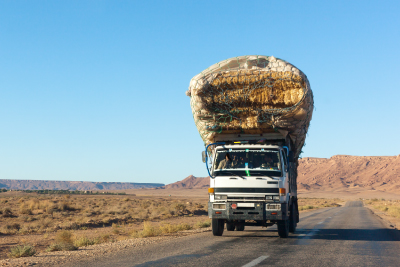Well-functioning transit transport services and procedures are essential to ensure people in landlocked developing countries have timely access to medical products and basic goods during and after the crisis.
When borders around the globe close, every country suffers, but those without territorial access to the sea are affected in unique ways, said a United Nations statement urging governments to provide smooth transit transport for landlocked neighbors.
Issued on 9 June by six UN agencies, the statement warned that economic and social conditions in many landlocked developing countries (LLDCs) – often the poorest in their regions – are worsening rapidly due to COVID-19 lockdown measures and international restrictions on the movement of goods and people.
On average, these 32 vulnerable nations lag behind the world average by 20% in the UN’s human development index. One-third of their 440 million inhabitants live in extreme poverty, 51% face food insecurity daily, and 40% lack access to electricity.
“The impacts of a combined lockdown measures, health pandemic and a global recession will likely halt or potentially even reverse LLDCs’ progress towards the Sustainable Development Goals and the aspirations included in the Vienna Programme of Action for the LLDCs for the Decade 2014-2024,” it said.
The Vienna programme of action was adopted by the international community in recognition of the complex challenges facing LLDCs and their special development needs.
The statement was signed by the heads of UNCTAD, the UN Office of the High Representative for the Least Developed Countries, Landlocked Developing Countries and Small Island Developing States (UN-OHRLLS), and the UN’s regional economic and social commissions for Africa (UN ECA), Asia and the Pacific (UN ESCAP), Europe (UN ECE) and Latin America and the Caribbean (UN ECLAC).
Unprecedented times call for decisive action
Even in normal times, functioning and efficient transport networks and procedures are crucial to connect these vulnerable nations to world markets, as their exports and imports must transit through at least one neighbouring state and often have to change the transport mode – making trade much more complex and costly.
“In these unprecedented times, there is an even more urgent need to ensure smooth transport of goods to and from these countries,” the statement said.
It added: “Transit transport is critical for LLDCs in both the short-term health response to the crisis by ensuring the delivery of much-needed medical equipment and basic goods, and the long-term economic response by facilitating trade and access to global markets and spurring economic pick-up post COVID-19.”
In addition to asserting the UN’s readiness to continue its support to LLDCs and their trading partners, the statement pleaded for decisive and immediate action to help landlocked developing countries while continuing to protect global public health. The heads of UN agencies called for:
-
Governments to refrain from any unjustified restraints on traffic and goods in transit to make sure that goods, medical equipment and basic goods and commodities can depart from and reach the LLDCs when needed, without delay or hindrance.
-
LLDCs and neighbouring countries to make use of trade facilitation standards and digital technologies that limit physical checks in transit, physical contact at borders and protect the health of workers, such as electronic exchange of information, electronic tracking, automation of customs procedures and other paperless solutions. The implementation of international conventions on trade and transport is of utmost importance.
-
Governments around the globe to respond to this pandemic not only by minimizing disruptions to international transport but also by viewing the crisis as an opportunity to reorient international freight transport operations towards a more sustainable path.
-
The strengthening of global and regional cooperation on transport connectivity.

